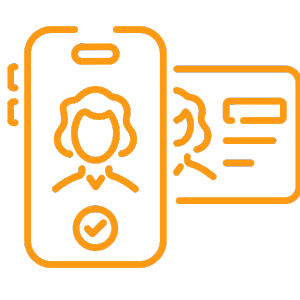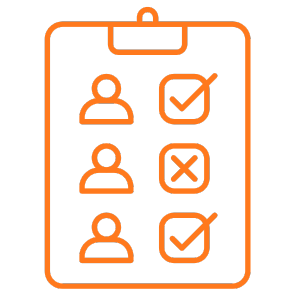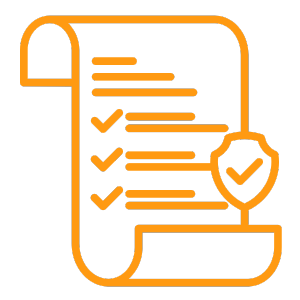Policies

Privacy Policy
Introduction
At Taybia Institute, we respect your privacy and recognize the importance of protecting the personal data you share with us. This Privacy Policy is designed to explain how we collect, use and protect your data while visiting our website or using our services.
Information We Collect
We collect different types of information to ensure that our services are delivered efficiently and that your experience with us improves. This information includes:
Personal Information:
- Name, National ID number, phone number, email.
- Academic information such as academic records and majors.
Technical Data:
- Internet Protocol (IP) address.
- The type of browser and device used.
- Cookie data to personalize your browsing experience.
Information you voluntarily provide:
- Inquiries, complaints, or any data you share via electronic forms.
How do we use your information?
We use the data we collect only for the following purposes:
- Improving our educational and administrative services.
- Manage student and staff accounts.
- Communicate with you regarding requests or inquiries.
- Improve our website and user experience.
- Compliance with legal and regulatory requirements.
Data protection
We are committed to taking all necessary security measures to protect your data from unauthorized access, loss or modification. These procedures include:
- Use encryption techniques and protect servers.
- Restrict access to sensitive information to authorized personnel only.
- Periodic review of our systems to ensure compliance with security standards.
Sharing information with third parties
- We do not share your personal data with any third parties except in the following cases:
- With your prior consent.
- When legally necessary: such as complying with laws or responding to the orders of the competent authorities.
- When needed to provide certain services: such as technical services provided by trusted partners, while ensuring that they adhere to privacy policies.
Use of cookies
- We may use cookies to improve your browsing experience on our website.
- You can adjust your browser settings to refuse cookies, but this may affect your experience of using some site services.
Your rights as a user
We are committed to protecting your rights in relation to your personal data, including:
- Access to information: You can request a copy of the personal data we hold about you.
- Update or correction: You can request to edit any inaccurate or out-of-date information.
- Deletion: You have the right to request the deletion of your personal data if there is no legal necessity to retain it.
- Withdrawal of consent: You can withdraw your consent to the processing of your data at any time.
Modifications to the Privacy Policy
We may update the Privacy Policy from time to time to suit legal or technical changes. Any changes will be posted on this page and are advised to review them regularly to ensure you are up to date.
Contact Us
If you have any questions or concerns regarding our Privacy Policy, you can contact us via:
- Email: [email protected]
What is academic integrity?
Academic integrity includes a commitment to honesty in all educational activities, such as tests, projects, assignments, and research. It also means respecting the work of others and making sure that all efforts in study or education are the result of genuine effort.
Anti-Fraud Policy
We consider cheating in all its forms to be a serious violation of the Institute’s rules, and we will work hard to implement strict policies to limit any conduct that violates academic integrity. This policy includes:
- Cheating in exams:
- Using or attempting to use illegal means during tests.
- Provide or receive unauthorized assistance during the exam.
- Plagiarism:
- Copy or use the ideas or actions of others without properly referring to them.
- Submit work or projects that are not the student’s achievement.
- Forgery:
- Misrepresent or alter facts in any academic document.
- Provide false information to manipulate results or any academic process.
- Illicit cooperation:
- Work with others contrary to the teacher’s directions.
- Participate in the distribution or use of prohibited educational materials.
Sanctions and disciplinary measures
Any breach of the Academic Integrity Policy will expose the student to disciplinary action that may include:
- Initial warning.
- Cancel the relevant work or test.
- Suspend registration for one or more semesters.
- Final dismissal from the institute.
Awareness and education
To avoid any breaches, the institute provides awareness programs and educational workshops on the importance of academic integrity, how to avoid cheating, and the correct ways to refer to sources.
Whistleblowing
The institute encourages all students and staff to report any practices that violate the Academic Integrity Policy. All reports are treated confidentially to ensure a safe and fair learning environment.
Your commitment makes the difference
We at Taiba Higher Training Institutes Company believe that every student is a partner in promoting academic integrity. We invite you to be part of this commitment to ensure a distinctive learning experience that contributes to your ambitions.

Beneficiary Identity Verification System
Beneficiary Identity Verification Systems
Taybia Institute attaches great importance to ensuring that all data and information related to beneficiaries, whether trainees or other members, are treated with the highest standards of security and confidentiality. To achieve this goal, the following systems have been adopted to verify the identity of the beneficiary:
Trainee Registration
Trainees are registered by entering the registration home page at the following link:
https://courses.taibainstitute.com.sa/Login to the personal
account After registration, go to the login page via the following link:
https://courses.taibainstitute.com.sa/dashboard/Adopting the national identity as a username
that uses the national identity as a username for trainees in the registration process on the platform. The beneficiary’s national ID is linked with the trainee’s email to ensure the accuracy and correctness of the data.Send verification
code Once the registration data is entered, a confirmation code is sent to the email registered by the trainee. The trainee must enter this code on the page designated to verify his identity and activate his account successfully.Completion of verification
After confirming the code and completing the verification process, the trainee is able to access all the services provided by the institute including registration in educational courses and participation in training activities.
At Taybia Institute, we are keen to provide a safe and reliable training experience for all beneficiaries, and we always strive to ensure the confidentiality and protection of their personal data.

E-Courses Evaluation Policy
E-Course Evaluation Grades Policy
E-Presence
E-attendance is calculated through:
- Simultaneous training: Attend lectures via live broadcast.
- Asynchronous training: Watch and verify access to recorded videos.
- Completion of the activities and evaluations of the course, as these activities are counted within the attendance criteria.
Semester and Final Exams:
- Tests may be in person at the Institute’s premises or conducted via electronic tests within predetermined dates.
Attendance Requirements:
- The trainee must attend at least 75% of the virtual classes.
- Commitment to perform electronic activities by no less than 75%.
Denial and exclusion from the program
- According to the approved regulations:
- If the trainee exceeds the absence rate of 25%, he/she will be excluded from the training program.
- This decision is applied to maintain the quality of the training and to ensure commitment by all participants.
E-assignments and tasks policy
- All assignments and assignments are submitted via the institute’s e-learning platform.
- File format:
- Assignments and assignments must be delivered in text editor format (Word) or PDF.
- Delivery times:
- A final date and time for the delivery of duties and tasks is determined. Any delay from the deadline may result in a deduction in grades or rejection of the assignment, according to the policy of the Institute.
Taibia Institute is committed to implementing these policies to ensure an integrated and effective learning experience for all trainees. All participants are kindly requested to adhere to the mentioned policies to ensure maximum benefit from the programs offered.

Trainee Work Follow-up Mechanism
Mechanism for following up the work of trainees
Taibia Institute is keen to provide a distinguished educational experience and continuous follow-up for trainees to ensure the achievement of educational goals and develop performance, through the following mechanisms:
1. Attendance Follow-up
- The trainees’ attendance is followed up on a weekly basis for each course in which the trainee is registered.
- In synchronous training:
- Ensure attendance and entry to virtual classes on time.
- In asynchronous training:
- Attendance registration is followed up by watching recorded lectures and completing scheduled activities.
2. Follow-up achievement
- Tasks performed after each lecture are evaluated in both types of training (synchronous and asynchronous).
- Ensure that the required projects and activities are uploaded through the e-learning platform according to the specified schedule.
3. Periodic evaluation
- Monthly tests:
- A monthly test is conducted to measure the level of trainee’s mastery of the course material and the progress made.
- Final exams:
- A comprehensive final exam is conducted at the end of the program to assess the overall performance of the trainee.
4. Monthly Reports
- A monthly report is sent to the trainee that includes:
- Attendance assessment.
- Grades earned in assignments and tests.
- Feedback from the trainer to clarify strengths and areas of development.
5. Reports available on the e-learning platform
- The electronic platform provides continuous reports that the trainee can view, including:
- Evaluations performed.
- Feedback provided by trainers for each task or activity.
- Details of the progress of the training program.
The Institute’s management and trainers are committed to continuous follow-up and necessary support for trainees to ensure an integrated and successful learning experience.

Attendance Policy
The importance of adhering to the attendance policy
At Taibah Higher Training Institutes Company, regular attendance is an essential part of the learning experience and academic success. We seek to promote discipline and responsibility among our students by emphasizing the importance of commitment to lectures and training sessions to achieve educational goals.
Attendance Policy
Adherence to schedule:
All students are required to attend on time as per the official study schedule.Attendance Registration:
Attendance is recorded electronically or manually at the beginning of each educational session, and this record is considered an official reference to determine the attendance rate for each student.Attendance Percentage:
Student attendance must not be less than 75% of the total credit hours for each course.
Absence Policy
Allowed vacations:
The student can be absent from study with a prior excuse, provided that he submits the necessary documents (such as medical reports or official letters) to the administration.Unexplained absenteeism:
- If a student is absent without an acceptable excuse, it will be considered an unjustified absence.
- Management will take the necessary actions in accordance with the policies described below.
Consequences of exceeding the percentage of absence:
- If a student exceeds the permitted absence rate (25% of the credit hours), this may lead to:
- Denying him entry to final exams.
- Registration of the failure mark in the relevant subject.
- If a student exceeds the permitted absence rate (25% of the credit hours), this may lead to:
Procedures in case of absence
- First warning:
An initial warning is sent if the student exceeds 10% of the credit hours. - Second warning:
A second warning is sent when the student exceeds 20% of the credit hours. - Final Procedure:
If the absence rate exceeds 25%, the student will be officially notified of the deprivation decision.
Special Exemptions
- In emergency or exceptional cases (such as critical health conditions), the student can apply for a review of the absence rates by providing the necessary evidence.
- Applications are evaluated by a competent committee for consideration.
Late attendance
- Frequent delay from the beginning of the lecture is considered a kind of partial absence.
- Three delays are counted as a full-day absence.
Student Responsibility
- The student should regularly review their attendance records to ensure their accuracy.
- Commit to providing excuses of absence as soon as possible to avoid any penalties.
The role of faculty members and administration
- Faculty members are obligated to accurately record attendance and absences and report any violations to the administration.
- The institute’s management works to provide an effective follow-up system to promote academic discipline.
For inquiries or reporting any issues related to attendance and absence, you can contact the Student Affairs Department through the designated channels.
Your commitment to regular attendance is key to your academic success. Together we work for a bright future.

Trainee Inquiry Response Policies
The importance of adhering to the attendance policy
At Taibah Higher Training Institutes Company, regular attendance is an essential part of the learning experience and academic success. We seek to promote discipline and responsibility among our students by emphasizing the importance of commitment to lectures and training sessions to achieve educational goals.
Attendance Policy
Adherence to schedule:
All students are required to attend on time as per the official study schedule.Attendance Registration:
Attendance is recorded electronically or manually at the beginning of each educational session, and this record is considered an official reference to determine the attendance rate for each student.Attendance Percentage:
Student attendance must not be less than 75% of the total credit hours for each course.
Absence Policy
Allowed vacations:
The student can be absent from study with a prior excuse, provided that he submits the necessary documents (such as medical reports or official letters) to the administration.Unexplained absenteeism:
- If a student is absent without an acceptable excuse, it will be considered an unjustified absence.
- Management will take the necessary actions in accordance with the policies described below.
Consequences of exceeding the percentage of absence:
- If a student exceeds the permitted absence rate (25% of the credit hours), this may lead to:
- Denying him entry to final exams.
- Registration of the failure mark in the relevant subject.
- If a student exceeds the permitted absence rate (25% of the credit hours), this may lead to:
Procedures in case of absence
- First warning:
An initial warning is sent if the student exceeds 10% of the credit hours. - Second warning:
A second warning is sent when the student exceeds 20% of the credit hours. - Final Procedure:
If the absence rate exceeds 25%, the student will be officially notified of the deprivation decision.
Special Exemptions
- In emergency or exceptional cases (such as critical health conditions), the student can apply for a review of the absence rates by providing the necessary evidence.
- Applications are evaluated by a competent committee for consideration.
Late attendance
- Frequent delay from the beginning of the lecture is considered a kind of partial absence.
- Three delays are counted as a full-day absence.
Student Responsibility
- The student should regularly review their attendance records to ensure their accuracy.
- Commit to providing excuses of absence as soon as possible to avoid any penalties.
The role of faculty members and administration
- Faculty members are obligated to accurately record attendance and absences and report any violations to the administration.
- The institute’s management works to provide an effective follow-up system to promote academic discipline.
For inquiries or reporting any issues related to attendance and absence, you can contact the Student Affairs Department through the designated channels.
Your commitment to regular attendance is key to your academic success. Together we work for a bright future.

Roles & Responsibilities Guide
Names of technicians, administrators and technicians, their roles and means of communication with them are shown in the attached table
| Field | Details |
|---|---|
| Employee Name | Mohamed |
| Function | General Maneger |
| Role | The role and responsibilities of a member of the technicians, administrators and legalization of the site |
| Social Media | 966666666 info@ |
